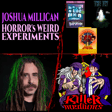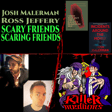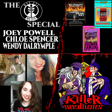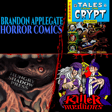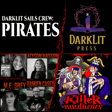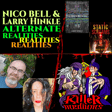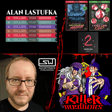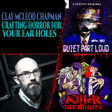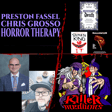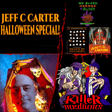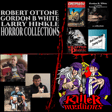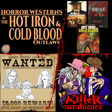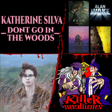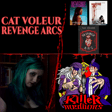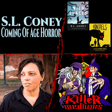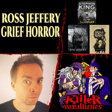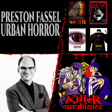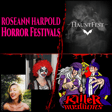Become a Creator today!Start creating today - Share your story with the world!
Start for free
00:00:00
00:00:01

KING-ESQUE HORROR with NAT CASSIDY
Nat Cassidy joins the show to talk about THE KING! What do we mean when we describe something as "King-Esque" horror, is Salem's Lot a good example of this? And why didn't the HBO Salem's Lot movie feel like it was effective? We then inject a healthy does of Nat Cassidy's Nestlings to the conversation, exploring vampires, organic settings, and much much more.
Come hang out with us one last time in the farewell episode for this podcast.
Recommended
Transcript
Introduction and Spoiler Warning
00:00:00
Speaker
Alright, hey listeners, this is William Sterling and you're listening to the Killer Mediums podcast where we talk about all your favorite horror tropes and how they manifest across all your favorite mediums of entertainment. Today we are talking to Nat Cassidy about King-esque horror stories. We'll dive into Nat's book Nestlings as well as King's book Salem's Lot and the new HBO movie that, you know, at least tried to adapt the novel.
00:00:23
Speaker
We'll get into it. Um, but we're sure to drop some, some spoilers for each as we talk. So if you are spoiler averse, be warned. But with all of that said, here we go. Let's get spooky.
00:00:43
Speaker
Burners tied bells to everybody in the morgue. So if they had a team, they knew somebody down there wasn't quite ready to go
Nat Cassidy's Background and Horror Niche
00:01:05
Speaker
Nat, how the hell are you doing today? I'm doing all right. It's good to be here. ah this This is an episode that's been a long time coming, so i'm I'm happy that we're finally making it happen. I will admit, I'm also very tired today. Same.
00:01:20
Speaker
Oh, man. I hope you have a better reason than I do, because I ah my only reason is that my wife and I went to Sleepy Hollow last night. oh and And I shouldn't even say last night. We went during the day. We just went to go up. You know, it's a 45 minute car ride from where we live ah and didn't do anything. Just kind of walked around, went to a farmer's market, hung out with some friends, didn't even drink.
00:01:41
Speaker
But I'm at the age now where like that alone. Now I'm just like, God, I'm tired today. I'm just say socialized and I spoke to people for a few hours. And so I'm I'm right. So I'm going to do my best to be coherent. Yeah. The ah the old introvert energy suck. Yeah. Yeah. Yeah. I had I had a ah a cider donut and like ah in ah and a tea in front of people. And so I'm just I'm fucking hungover from the effort.
00:02:09
Speaker
ah which has to be here, I should say. I'm gonna get a jolt of adrenaline. We're gonna talk about vampires. Let's do it. Yeah, speaking of energy sucks. ah Before we dive into that, though, for anybody that is unfamiliar with you, could you just take a moment, go ahead and introduce yourself to listeners that don't know you very well. And then if you had to define it, what is your niche in the horror community? Oh, man. Oh, man, that is such a good question.
00:02:36
Speaker
um ah Well, ah I don't know. I'm a I'm a I'm a middle aged cis white man. Like I feel like historically horror is just not offered that perspective. So that's my niche. No, you know, offering just a valuable POV from a from a neglected source. No, I. So yeah, I'm Nat Cassidy. I wrote Mary Colon and Awakening of Terror and Nestlings and Rest Stop and the upcoming When the Wolf Comes Home. And
00:03:10
Speaker
Oh, I like to look at myself as, ah you know, I'm i'm a former horror playwright and I've been an actor my whole life. So I you know i continue to be an actor on stage and on TV and and whatnot. And ah so yeah, I like to think of myself as bringing that sort of perspective to storytelling in general, the sort of the dramatists eye to novel writing is is how I sometimes look at my my niche in the horror community. There are a few others of us who are also have like a background in in theater and playwriting and stuff like that.
00:03:46
Speaker
And i I find that former playwrights, semi-retired playwrights, as I kind of think of myself, ah bring like ah bring an interesting perspective to the actual ah science of dramaturgy, of of telling a story, of breaking a story, and rolling it into a reader's ah attention.
00:04:07
Speaker
ah So i always i I always like to kind of think of that when I sit down to actually like write a novel. Like how am I honoring those dramatic roots in how I choose to tell a story? That's one way. no Yeah. Yeah. I love it.
00:04:22
Speaker
That reminds me of ah when I had Clay on, Clay McLeod, and he was talking about his kind of roots in in the theater. Clay and I are old friends from the New York theater community. like we ah um over over the years often had like shows of ours running at the same time and got to know each other that way first. ah So it's ah we're we're we're very good close friends because of that. like we We have a lot of shared New York theater trauma bonds that we can share with each other.
00:04:55
Speaker
Cheers. um Going a little off script here just because kind of we're in this zone right now.
Storytelling in Horror and King-esque Characteristics
00:05:01
Speaker
um Talking about like taking tips and tricks from the stage and putting it into like written word. If you you had one piece of advice for other writers that maybe don't have that stage experience, what is one thing you would recommend writers, authors, screenwriters, you know whoever's listening right now, ah try to inject a little more of into there their books, short schools, whatever. For me, I think it comes down to when you're writing a play,
00:05:32
Speaker
Or you know ideally when you're writing a movie, but but ah but for examples that we can go into later in this episode, ah this isn't always the case. But almost generally, always when you're writing a play, you want to think of how to move the story with human interaction. What is it about this human interaction that is causing this this story? And and that that means story, not the plot, ah ah because story and plot are are two different things. But ideally, what is what is this interaction between two people in a room doing to the story? How is it progressing it? How is it turning it into a dramatic moment? ah and And what is it saying about ah the the overall story that you're trying to tell? um A lot of times, I think stories that don't have that sort of training or storytellers that don't have that kind of training can have external events become more important than the internal events.
00:06:29
Speaker
ah And again, as the the case we will explore ah today, like it'll just be like a collection of moments that then like that's the that's your plot. That's the story that we've watched. And ultimately you're like, but who changed? What happened in there? Like, what would what was the the the ah dynamic?
00:06:50
Speaker
change-ups and growth that occurred during this that when you are telling a story that is literally human bodies and voices in a room ah transmitting that story when you don't have the the crutches of ah special effects and or or you know sometimes this is a crutch in novel writing that interiority and you can just have something be entirely ah ah dramatized within somebody's head and you lose the ah the actual like interplay between people. You lose that kind of live ah dynamic. ah it can It can get a bit staid. It can get a bit stodgy and stuffy and boring or you know just kind of ah monotonous. like There's a lot of action movies that can just be kind of monotonous because nothing is happening interiorly, and in interior wise. I don't know however you want to make that negative.
00:07:45
Speaker
ah I find that playwriting... forces you to find the middle ground between the external spectacle and the internal windows that that ah that on one hand movies give you and on the other hand novels give you. um So you have to find a way to reveal these sort of things through human interaction. And ah that to me is just like the most satisfying way to tell a story. ah And so ah constantly when i'm when I'm writing something that is not a play, I will come back to those lessons and see if that can enrich the material in some sort of way.
00:08:19
Speaker
Nice. I can't imagine which of our three topics you were kind of winking and nodding at with the external forces moving a story along and not internal forces. um Out of Stephen King's Salem's Lot and your book Nestlings and HBO Salem's Lot. One of those things is not like the other. What a mystery. I guess we're gonna have to get to it. So broad topic. Let's crack this open then.
00:08:44
Speaker
ah We are here to talk about King-esque horror today, which is, you know, more than most topics we try to hit on this show. It's kind of a hard to pin down sub-genre. King is prolific. He writes all sorts of stuff. And yet when we say, oh yeah, that's a very King-ish story or a very King-ish novel,
00:09:06
Speaker
People kind of know what we're talking about, despite the range that he's shown off of genres, of styles, of like mediums of entertainment, everything else. yeah um But also, it is a term that is thrown out frequently, including lovingly, to describe your works. So for you, when you hear somebody describing your books or, you know, anything else as king-esque,
00:09:29
Speaker
What does that mean to you? What ah what is that word or phrase or what however we're describing it? What does it mean? It means set in Maine. I kid, I kid, I kid. No, I'm so glad to talk about this because yeah, it is a, it's a catch-all term, but like, you don't hear a lot of in-depth analysis of like what that means. I think a lot of times some people just use that as a shorthand for like kids on bikes or something like that. And they're like, oh yeah, that's a Stephen King sort of, you know, stranger things is a Stephen King sort of story. And they just think that it means small town,
00:10:06
Speaker
Hid protagonist yeah ah fighting some larger evil with the with their sort of plucky childlike ah tools against it. ah But to me,
00:10:17
Speaker
I think it means, it's as you because you've so ah aptly put it already, that the the body of King's work is staggeringly diverse. It's not just huge, but it's incredibly diverse. I mean, what other writer can you point to where you'll have like Shawshank Redemption and Stand By Me and Abt Pupil, and this is one collection, ah and including The Breathing Method, which no one talks about.
00:10:39
Speaker
in that collection. But like that could mean the Shining. It could mean it. It could mean Dolores Claiborne. It could mean ah the Institute or Bag of Bone. like It's such a ah diverse ah corpus of material.
00:10:53
Speaker
And to me I think the, the ah unifying aspect to all of them, and the thing that I find is also like my modus operandi when I'm working and feel like the most pleased about if I ever earn that sort of epithet.
00:11:09
Speaker
um is that it is ah it's it's stories that are told from a character eye view. And this actually like goes into what we were kind of just talking about, because Stephen King was a huge influence on me, even as a playwright, even though he doesn't write plays. um ah the The first attempt at the Shining notwithstanding, like I found as a playwright that Stephen King was hugely and influential on me because he,
00:11:37
Speaker
he writes stories in a very experiential way. He writes stories in a way that that that it's grounded in character, sometimes to a fault. Like ah there are sometimes where it's just like, oh my God, cut it out with the italics. We don't need every thought about every moment. We don't need every bit of backstory. We don't need to know their bowel habits all the time. Like, you know, sometimes you will go so deep into it ah that it can ah sometimes, rarely, but sometimes like slow things down or make things feel that they're too padded.
00:12:07
Speaker
ah But I would I would always rather that than something that feels kind of superficial or something that feels ah like ah it doesn't find that this character is worth your time or worth your effort to get to know. I also find that there is a very undervalued balance between the literate and the, you know, for lack of a better term, the the blue collar, the populist. King himself even likes to self-deprecate his work by saying it's the literary equivalent of Big Mac and fries. And that's funny and makes a certain amount of sense. But like, I also think that really sells himself short ah in a way that's that's kind of unfair. I've always found there to be a great
00:12:53
Speaker
literary value to ah to King's work. um And I think Salem's Lot actually as a book is a great um is a great window into that even though some have argued that it's kind of unsuccessful you can ah at this particular aspect you can still see his ambitions in this book that go beyond um just like you know a potboiler just be beyond trying to just scare or be gross or or oogie um you know this is a book that Oh, like literally explicitly references Shirley Jackson and and has a Wallace Stevens poem is like one of its part ah titles and ah George Safaris is quoted it and like it's just like he often will bring these more literary, ah high minded, quote unquote, sort of ah ah influences to genre to these pulpy or sort of things.
00:13:49
Speaker
ah and i ever since I was a little kid and and was first reading these books ah at a young age, ah was exposed to things that were all of a of much more nutritional value than his detractors would give him credit for. it i always found that like That was a major point of the experience. like You're not just reading about ah You know belching wife beating sort of ugly pimply asked like ah characters but like there's something larger at play there's there's there's a a commentary on a ah ah ah larger truth about the human condition.
00:14:29
Speaker
um that he is getting at, whether successfully or not. like that that That ambition is there. um So I find that to be like a big part of what it means to be King-esque. It's not just trying to trying to tell a potboiler spooky story in a small town, ah but like theres there's an it there's an analysis, there's an investigation about something larger there.
00:14:52
Speaker
um And I think the final image, you know, I'll stop rambling ah shortly, but I think the the final aspect of King esk is that he's a very visual writer. His first editor, Bill Thompson, even said like, ah Steve has a ah movie camera in his head. And I think that that's a big aspect of it, too. like And again, it goes back to to what I was rambling about earlier of trying to find an exterior way to um to convey story, to convey exposition. ah He likes to do that through dialogue, through scenes, and through ah exterior action um in a way that I think A has made him so ah uniquely suitable for adaptation, ah but also like it just is a compelling way to make a story move ah at ah at a good clip. ah he He is very
00:15:45
Speaker
naturally adept at finding that balance between interior work ah and exterior sort of ah um exposition, ah exterior expositional scenes and things like that, ah and ah can paint a visual picture in a very compelling way. He's really good at hooks.
00:16:04
Speaker
ah He's a very hooky writer. And so like that's something I always try and keep in mind, too, when I'm breaking a story. What's the hook for this? What's the visual hook? what's the ah what's the you know the the what are What are the cliffhangers, whether it's even just like in the language with like a section break or something like that? what is What is a hook that will make the reader want to ah read the next section, the next chapter, the next part, ah the next moment, the next book?
00:16:31
Speaker
um You know, he's he's really, really good at that. So that's my short definition of what it mean means to be King-esque. Okay, there's a hundred different ways I want to bring the interview now. ah So many things I want to bounce back to. I think I want to keep the focus on Stephen King for now though, because there's there's a lot of things that I could like start diving into like, okay, so with that in mind, let's talk about
'Salem's Lot' Reflections and Adaptation Critique
00:16:52
Speaker
your books. I want to hold that for a second. With that in mind, if that is King's kind of aura in a nutshell, everything that you're talking about,
00:17:01
Speaker
then let's focus the lens on Salem's Lot, the book for a minute here, and let's kind of start our deep dive into these and individual topics with that. So for Salem's Lot, the book, you mentioned that a couple of things about like levers that King pulled within the book that are kind of reflective of his own style, but I want to bring you back a little bit. Do you remember your first introduction to Salem's Lot and just the impression that it left on you was this,
00:17:29
Speaker
Was this early in your King adventure where like he's getting his hooks into you for the first time with this book? Or had you read a lot of King before this so you kind of had this understanding of what he tries to do in his novels and then Salem's Lot comes along? How did you find Salem's Lot the first time? Yeah, ah um Salem's Lot was it was a very early book for me, a kind of foundational book.
00:17:55
Speaker
actually, because ah I was raised in a very Stephen King obsessed household. i was I was raised by a single mom and my mom loved Salem's Lot. ah That was one of her favorites, specifically because of the mini series, the Toby Hooper mini series. And that scared the hell out of her. So ah from an early age, I knew that Salem's Lot was like one of the scariest ones. And I was very excited to finally tackle it. It was probably um
00:18:26
Speaker
I would say was probably like the the third or fourth book of his I read. um And one of the reasons why I point out that I started reading him so young was that would that would have been like the late 80s, early 90s when I started reading him. So I didn't have as huge a backlog to ah to catch up on. and And I did it very, very quickly. Like, I think ah ah the first The first book of his that I read live, like as it was released was Rose Matter. And up until that point, like I was just like gobbling up his back catalog. ah And Salem's that was one of the the ones that I was like the most excited to get to so that I could then watch the the mini series. And ah my mom was right. Like I totally got why she was so effectively scared by this book. I think it is one of his ah
00:19:21
Speaker
one of his most dread-filled books. I think it's one of his most effectively scary books. ah And so it's always had a a real a special place in my heart ah because of that. like there was There are a lot of things I learned from it. There there are some things that I still learn to this day when I go back and reread it, which I try and do every few years. There are a lot of flaws to it that I find to be really revealing and interesting.
00:19:47
Speaker
about the writing process and and things that I think he learned as he was writing it too. ah So I love this book. I think this book is of great value as ah as a horror novel and also is just kind of like ah an instructive manual for how to tell a story like this.
00:20:05
Speaker
Okay, I was gonna follow this up with just the generic, ah what is a part that stuck out to you the most sort of a question, but but you gave me a little little tidbit to grab onto here. um So lessons learned from this are things that Salem's Lot did really well. And then what's one of those flaws that you were just talking about? What is something that you feel like could be improved upon if Steven revisited this all these years? yeah Well, and I think he does revisit, like I think you can, because he was writing at such a clip and because he was, ah you know, he was so hungry, literally and figuratively during these years, during the early years of his career as a novelist, you can kind of see him picking up where he left off with each book and like doing this better and doing that better. ah So for me, like Carrie,
00:20:55
Speaker
I've always felt like reads like a novel written by someone who's really used to writing short stories. And he had written some other shorter first novels before Carrie. It's not like it's his first attempt at writing a novel. ah But Carrie, you can see how it's it's it's a story that's more about an event then ah than a character. But there's like all this sort of naive early attempts at character work, and it it works really well when it works. ah But it's a really short work. It's leading up to a punchline. It's padded with all this extra material and third-party excerpts and newspaper articles and interviews and things like that. ah So you can really see that like there's the instincts of a short story writer in there
00:21:43
Speaker
learning how to tell a larger narrative. And then you get to Salem's Lot. And it is almost the the inverse of that where it's like, you can see him being like, oh, I have this canvas to tell a huge story and you know all these like little short stories within it that that ah will will contribute to this larger narrative. And so like he he starts flexing these muscles of like, no, this is a story about a town. It's even named after the town, the town.
00:22:15
Speaker
is the main character and I'm going to show how the town changes ah and ah you know get all these different perspectives on the town there's this there's this polyphony to it that is so novel esque and there again are like these literary pretensions and and attempts to like you know revisit what patent place does and and our town does and really examine this ah this larger scope than just this this bullied girl at the prom that ends with this horrible ah you know sort of punchline of ah of a fairy tale inversion so is so.
00:22:52
Speaker
Because of that, you see the moments where, um you know, the Stephen King that we know of as his career progresses really finds his footing. We see we see how he ah is really immediately adept at a big cast sort of ah sort of story. ah A short, ah not a short, but a small town as a sort of body politic and as a ah as a a larger canvas, as I've as i've already said. like you You can see how immediately talented he is at these sort of things. ah And, you know, kind of lifting up these rocks and seeing all the seedy underbellies of all these people and and and the decaying American town and the American dream as it really is and all these sort of things.
00:23:41
Speaker
that he'll revisit again and again and again with it with Needful Things with all these other like ah with the Castle Rock stories ah and and things like that. um So you see that right away. ah But you also like the flaws that you can kind of see him figuring out how to tackle. I think are that like the the the peripheral characters are so much more um memorable than the main cast. Like Ben Mears is it is a a fine, I guess, protagonist, but like there's kind of nothing there when you compare him to like Bill Denbrough or any of his other like writer protagonists. Ben is kind of, you know, he's kind of flat. Susan
00:24:25
Speaker
is a little less flat. She's more interesting, but she gets fucking, you know, taken off the off the off the ah board relatively early ah in in the book and Mark is the closest thing I think we get to a really compelling a central character, but he's also just like a little archetypal. it's It's when you think of Salem's Lot, what you really are remembering is is Weasel and Eva Miller and Father Callahan and the McDougalls and like all these out outside of the principal cast characters.
00:24:57
Speaker
ah that ah he manages to sketch very deftly and and relatively concisely, even though they can you know seem like they're sort of stock characters in their own right. Those are the ones that you really remember. So I think it's not until his next book with The Shining where he really is like, okay, I'm really good at ah history and ah making a place feel like a character. So, you know, how's that going to affect writing this much more claustrophobic narrative about, you know, place as character, the overlook is, you know, kind of just like Salem's Lot, we're gonna get its history, its deep dive, but now I don't have this ah this ability to,
00:25:39
Speaker
use all of these characters to kind of create a mosaic. I got to get back to this central cast and make them as rich and compelling as possible. ah So I think you see him kind of filling in the shortcomings that Salem's Lot kind of has as ah as a narrative ah with his next book. And then from there, he's he's off to the races. He's on fire with with a with being able to do both things at once, have a panoply of of perspective, but also making sure that his heroes as central characters are as fully fleshed out and compelling ah as possible. um and And I should say that I think the cardboard Latin-ness of of a Ben Mears, of ah of a Susan
00:26:26
Speaker
although less so for Susan. I think that works for Salem's Lot. I think Salem's Lot is as scary and dreadful as it is because there's a disposability to the central characters. There's this feeling of like, oh, they could go at any time. Like everybody is going to be revealed to be expendable in this story, even though you have that little flash forward at the at the beginning.
00:26:47
Speaker
um but And I think that like so that that pushes you forward in that sense of dread, in that feeling of, um you know I am Ben Mears then, because because Ben Mears feels so ah ah so not specific as a character. You can't help but bring yourself into his ah into his perspective ah in a weirdly, backwardsly successful way. ah So I think that makes Salem's lot even scarier, if that makes sense.
00:27:17
Speaker
It does. And we're also starting to click into, I want to introduce the movie to the conversation now, because I think what we're talking about here is getting into something that the movie missed where those flat cardboard cutout characters are basically the only things in the movie. um follow it Father Callahan gets relegated to like three scenes and I i don't think Weasel gets any screen time. I remember there's a shot where Ethel like yells down the stairs at Weasel and we kind of see his figure pass and that's it.
00:27:53
Speaker
um but Let's talk about the movie for a little bit. ah So we we got an attempt at taking this 1,000, I think my copy is 1,300 pages long ah the way it's printed.
00:28:10
Speaker
an attempt to condense all of that down to a two-hour movie, and just from the jump, that's not gonna work out great. um And, you know, it is rare that Twitter agrees with anything nowadays, horror Twitter, but we all kind of seem to be in agreement on this one. It's it's missing something. It's missing some weight.
00:28:33
Speaker
So what were your thoughts on the movie? I know I kind of primed you there for a specific answer, but what were your thoughts on the movie um and how did it kind of work into everything you're saying about internal motivations and all these side characters and everything else going on?
00:28:51
Speaker
Yeah, i I mean, I'm going to make my I'm going to be as diplomatic as as possible um a because you never know who you're going to work with. ah view Right. But also like I used to so I used to review ah theater for a pretty prominent ah website in in New York and our editor in chief and the owner of the of the site was very adamant about fair reviewing standards and he would always hammer home Because it's so easy, you know, when you see something that you don't like to be like, are you fucking rude? Like that stole so many hours of my life and that fucking sucked. I'm so mad about how bad that was. ah which you Which you are not doing. I'm not saying you were doing this at all. You're also being very, very diplomatic. ah But he would always hammer home that no one makes ah bad art to specifically piss you off.
00:29:43
Speaker
ah Like so it's so hard to make anything let alone like a good thing and especially with movies there's so many ah external forces ah and so many Small pieces of work that have to build to make this cohesive thing um All of which is so all of which is to say like there are things I liked about it There were definitely things I thought that worked there were and there were things that I was like, oh I I think I see what you were trying to do here and it didn't work for me and I have heard that like the first cut of this movie was three hours long. Yes. And that makes sense to me. Like that is what this movie would need to be because what we got, I think, as as you've so rightly put. It to me.
00:30:26
Speaker
ah Fundamentally.
00:30:31
Speaker
mistakes what the point of the source material is. like ah you can You can phrase that in a number of different ways. ah it was It was too fast, it was too short, um but I think ultimately what it kind of failed to do was honor the point of the property. And there are ways to do that in more concise ways and faster ways, if that's what it was interested in doing. ah But it seems what it was interested in doing instead was ah telling a vampire story with a lot of jump scares and a lot of people running at the camera. ah And if if that's what you want to do, why would you choose the source material that's about the slow corruption of a small town? You know, it's like it's like wanting to tell like a story about like
00:31:18
Speaker
doomed bank robbers, and you're like, well, I'm gonna adapt Anna Karenina. Like, it's just, it's not, that's not what this story is. You could have, you could have done fucking Popsie or any other, there's several other Stephen King short stories, but that's really what you wanted to do. um But like, what, so what does that mean? What does what does that ah ultimately ah mean as far as um how it landed for me? I think, I think what it, if if I had to point to one overarching fundamental blah of this adaptation or the thing that really didn't work for me. It's it's less that like, oh, we didn't get you know that we didn't get the ah the guy at the dump. We didn't get Doug Rogers. We didn't get the McDougalls. We didn't get the bus driver. like ah Ultimately, yeah, that would have been great to have seen, but but really what this movie didn't do for me is I
00:32:13
Speaker
what What was the point? like What was the story it was trying to tell to bring it back to what I was talking about earlier? like It felt felt like it was all plot and no story. and like ah Just as an example,
00:32:29
Speaker
um I thought the cast was great. I thought they were trying some interesting things with some of the characters that were compelling enough on the surface, but but to what end? you know i I thought Alfrey Woodard was was fantastic and and you know always brings like a great energy to things. but like Okay, this is a small town in Maine in the 1970s and your primary care physician is not only a woman but a black woman. Okay, what does that mean? Like how does that change her interactions with people? Does she have some people that don't trust her or don't like her and they grow to like her by the end of the movie? ah No, we're not doing that. and she's She's just going to be a doctor who's a black woman and we're not even going to like
00:33:15
Speaker
investigate what that means. Okay, fine. ah What does it mean for there to be the Marston house and Ben Mears wants to come and visit the Mars and no, we're not going to investigate that at all. Like that's not going to pay off at all. with it We're just going to introduce that and then the the climax is going to be at ah at a drive in movie theater. Okay, so like it was just like a series of things like that where you were like,
00:33:37
Speaker
Your Act One is not talking to your Act Three. No one is changing through the course of this of this ah ah struggle with these vampires. and and And there were ways where you could have done that economically.
00:33:54
Speaker
ah But that wasn't done. Instead, it was just like, here is a character, and here is a a a jump scare, and now we're going to move on. And so I found that to be kind of dispiriting and ah disappointing because it seemed like there were ingredients for a new-ish take on the source material in a way that could have been compelling.
00:34:21
Speaker
ah Because again, like I think it's really well cast. I think it's really well shot. ah There are some images in it that I that i think are really um memorable. But again, to what and what were you trying? I'm sorry, I'm making this about you. ah It's not used physically, but but ah to the filmmakers writ large, like what were you trying to tell with this story other than like vampires? Ah, you know? Yeah, yeah, yeah, I get it. ah Side note, i I do feel attacked right now. So I'm sorry. I'm sorry. But you should have fixed it. But no, i I absolutely get your point in in a
00:35:00
Speaker
In a novel where the characters are so compelling, um having the characters be flat and one note and kind of there just to chew scenery for a little bit felt odd.
00:35:16
Speaker
Yeah, yeah, like down to like the first scene. That was the first time that I was like, oh, no, I think I see ah where the critiques of this ah adaptation are are all coming from, because like I thought it was a great ah alteration to start with. um ah um Straker hiring the guys to go pick up the crate. Great. Let's just jump in to the fucking story. I love it. But there was no choice made to ah to make the townie, Royal Snow, interesting. like Not even like a little character quirk, which you know is this a thing that can be done too much. You can lay that on too thick. But this didn't seem like it wanted to lay it on at all. So he was just a character who was there to receive information and then go do a thing.
00:36:04
Speaker
ah But like, what about that character makes him him? You know what I mean? Yeah, like it it was that again and again and again and again. So the only thing differentiating these characters was the actors portraying them, not the characters as, you know, fully fleshed ah roles to inhabit. ah Each one kind of talked to the same. and There was ah like a similar level of sassiness. ah And, um you know, again, like nobody changed their perspective.
00:36:32
Speaker
Nobody was like even that shocked about vampires. It it just kind of seemed like everyone received that information and was like, okay, got it. frightened ver fireers moving yeah not a Not a moment of skepticism ah in the bud. I think like you know maybe there's 30 seconds of skepticism just to like cross that off the list.
00:36:49
Speaker
ah but yeah so it was you know Again, like why there were there were a couple of moments where like you could see what it could have been. like i I thought ah Larry Crockett, the the real estate guy, I was like, okay, like that feels like a character. I feel like I'm remembering who that would be. ah But then you go into like the library and it's just like an exposition dump of of you know the town gossip being like, that is Ben Mears. His parents died in a in a car accident and he did this and he did this and goodbye.
00:37:19
Speaker
credit Like, great, we're just receiving information. And, ah you know, it so it just feels very perfunctory. And again, like, that's the inverse of the experience reading the book where it's like, oh, I'm in this really warts and all fully fleshed out town. And maybe my protagonists are a little flimsy, but like I'm in a world that feels real. And so now I am the protagonist.
00:37:47
Speaker
And ah you you get really none of that in this particular adaptation. And I would suspect that a an additional hour to slow down a little would ah help alleviate some of those ah some of those problems. Yeah.
00:38:05
Speaker
Or maybe it's just an hour of Gordon Lightfoot. I don't know. But that's fine. The soundtrack was great. So so more of more of the same. Fine. Bring it. Yes. If nothing else, we got a new soundtrack to write to out of this movie. It is good. It's really good. Yeah. And visually, I thought it was you know like ah ah Mrs. Glick sitting up on the ah mortuary table. I thought that looked great. um there were There were a number of... ah I even liked...
00:38:31
Speaker
the the climax in the drive-thru, I thought that was well staged and interesting. I just didn't see why why did we introduce the Marston House then? Like what was the point of that other than saying like this is a book that has the Marston House. We don't even get the backstory of the Marston House. And if the climax isn't going to take place in that thing, you know, it's dramatic writing 101. Don't set something up in the beginning if it doesn't have a purpose to your story. ah and And they just, they go to the Marston House. They're like, okay, we crossed our interactions with this building off.
00:39:09
Speaker
ah So now let's have this set piece in the drive-through or the drive-in theater and as as neat visually as that um as that set piece was also there was just like You you vampires took over a whole town. Why are y'all staying in the trunks of cars? What is the logic behind? Why are you doing this? Because then it looks cool Yeah I know I'm with you. ah Yeah, I wound up like I used to hate the 2004 miniseries adaptation. ah That used to be like one of my least favorite Stephen King adaptations.
00:39:48
Speaker
And after watching this I was like, I kind of a soft spot for that because at least that was trying to tell a story as imperfect as I think that adaptation is and weirdly obscure now like nobody talks about ah the Rob Lowe Donald Sutherland Rutger Howard TBS miniseries from 2004, which is kind of shocking.
00:40:09
Speaker
um But like, it's just not available anywhere. It's been totally memory hold. And that at least was doing some interesting things like Andre Brower is great in it. Donald Sutherland is great in it. They try like a slightly different thing with Ben's backstory, which is, you know, interesting. And they were trying to tell a story of these characters in this small town. And granted, they had four hours to tell it instead of, you know, an hour and 59 minutes or whatever.
00:40:37
Speaker
uh but it I think it all comes down to intent and I did not see what the intent of this movie was other than like vampires go boo um okay so in order to spin off some of those points of conversation I want to introduce one more element to to the proceedings here bring it like Salem's lot the book which is a very, very long written way of doing some things very effectively. We've got Salem's Not the Movie, which is a very, very short movie attempt. at now I don't know. and Well, it landed.
Exploring 'Nestlings' and Thematic Connections
00:41:12
Speaker
And then we have your novel Nestlings. ah If I can wax poetic for just a second to try to introduce a little bit of this angle, and then I'll let you introduce the book yourself.
00:41:26
Speaker
um We have kind of established at this point that you are a big Stephen King fan. um And there are a lot of points of connection here that we haven't even like tried to throw out for listeners yet. so Um, just introducing a couple to the conversation. There is another podcast called talking scared, which there is absolutely no way you are listening to this podcast and unaware of that one. So i' I'll let it just kind of stand on its own. Neil's amazing. Um, but you have been on that podcast multiple times twice to do, um, recaps or revisits of Stephen King works.
00:42:06
Speaker
You were on Talking Scared's It breakdown episode, which King himself gave his nod of approval to. ah You were in their Carrie 50th anniversary episode, breaking that story down. You are in the upcoming anthology, The End of the World as We Know It, Tales of Stephen King's The Stand, which is a Stephen King approved series of stories set in the world of The Stand.
00:42:32
Speaker
both your novel, Mary, colon an awakening of terror and the Nestlings have been described by yourself and others as love letters, two different eras of King lit. um So with Mary kind of having connections to, sorry, with Mary having connections to Carrie and then Nestlings having connections to Salem's lot and the shining, whoa, there's a lot of stuff here.
00:42:59
Speaker
um How, I don't know, how has that journey been for you kind of being a fan of King and then as we're getting more and more into this stuff, just building out all those points of connection, is it?
00:43:13
Speaker
I don't know. Could you talk about that first? I don't have a question here. I'm really bad at turning my my thoughts into questions, but maybe you can pick me up. i I get you. I get i get where you're going. um And ah not to correct you on air, but actually I was also on the Talking Scared episode where we talked about Stephen King's short stories. So I also didn't dive into Mrs. Todd's shortcut. ah So it's really, ah it's even more than that.
00:43:39
Speaker
Um, and Neil, ah bless his heart, ah keeps telling me and he's he's correct. ah So I'm attempting to ah to honor this note. he He keeps telling me that I should stop making king comparisons to my works because like they're more than that. It's going to start seeming like I'm just like some sort of like a cover band or something like that. And I get that, like, especially when I hear it laid out like that, I'm like, oh, boy, I don't want people thinking that I'm just like some sort of pastiche artist. um But like one of the things I love doing with writing and I did this as a playwright, too. um And, you know, even as my background as an actor kind of has led into because I
00:44:21
Speaker
ah first and foremost was a was a classical theater actor. I've been doing Shakespeare since I was a little kid and like Shakespeare is the only other author who comes close to Stephen King as like an influence in my my life and my aesthetic and my the way I approach storytelling and things like that.
00:44:40
Speaker
um They go hand in hand for me. um And one of the things about that is Shakespeare and Stephen King in their own work and then my relationship to their work ah is a similar dynamic in which they are investigating their influences ah and putting their own spin on it.
00:45:00
Speaker
ah you know, Shakespeare's doing that with Plautus and Terrence and Hollenshed and like all these other influences that that he was a big fan of and putting his own spin on it. And, you know, he wrote very, very few original plots who would just kind of recycle plots in his own way. And Stephen King similarly, like, you know, he writes his own original plots, but you can really when you are familiar with his work and his influences,
00:45:23
Speaker
you see how like, oh, that's your Bradbury pastiche, that's your Matheson pastiche, that's a Beaumont, that's EC Comics. Like you can see him, Salem's not another perfect example where it's like, in some ways, beat for beat, Dracula, but set in Peyton Place. ah So I do a similar thing, that's just kind of the way I like to metabolize ah the art that resonates with me, ah is I like to then have a conversation with it. In ah in a new story, in a new way, in ah integrating new ingredients and things like that uh but trying to find my own uh point of view on a similar thing it's in a way like this this sounds so fucking pretentious so forgive me but uh an ex-girlfriend of mine
00:46:09
Speaker
used to she She introduced me to a ah quote that I'm going to mangle and i'm as I'm speaking this I'm blanking on the originator of this quote so forgive me doubly but the basic premise was um Don't seek to copy ah what the people who came before you did. Seek what they sought. And like that's that's kind of ah an MO for me, is to not copy what they did, but to to seek what they sought. like what were they
00:46:41
Speaker
investigating with this thing? What was Stephen King investigating with the vampire story? ah And how can I use nestlings to do my own investigation? Using Salem's Lot as, of course, an ingredient to throw into that blender, but still to kind of Find my own take on what I think he was doing or what he wanted to do similarly with The Shining. And with Mary, that was also like a very maybe even more explicit case of like, OK, he was telling this story about ah puberty and bullying and and things like that. I want to tell a story about ah perimenopause and but ah misogyny and um and things like that. ah How can I?
00:47:26
Speaker
do what he did with Carrie with my own story. um And so that's how I tend to look at it like when I, when I sit down to write a story that I know is going to have some sort of influence and I can't not have an influence like it feels almost dishonest to me to like pretend like I'm writing in a vacuum where like you know these books that I've read multiple times since I learned how to read ah haven't shaped my perspective on on how to tell a story. um it's it's like it would It would take more energy to deny their influences than to just kind of lean into it and be like,
00:48:04
Speaker
All right, well, that's that was where ah that baton race kind of left off. Let me pick up the baton and and see ah you know if I have anything new to bring to this sort of sort of thing. And ah I find that to be a very exciting thing. And in a in a ah ah thing that is very enriching is very exciting. like It was great. I'm sure we'll go into this in more detail in ah in a bit. but like as a As a Jewish person, I love Salem's Lot. I love ah you know the other big um ah influence on Nestlings is Rosemary's Baby. I love Rosemary's Baby as a book, as a movie. um But like as ah again, as ah as a Jewish reader, you read these stories about like glowing crosses and the Antichrist, and you're like, huh,
00:48:53
Speaker
how does that hit me? Like, what do I as a Jew have to say about these stories that are, you know, fundamentally grounded in Christian iconography? And not only that, are saying like, these are the tools to fight evil. um What does that mean for me? And so I wanted to tell a Jewish story in Nestlings that's about um that's about those same monsters and about those same dynamics. Or similarly, like I've lived in New York City for half of my life. I grew up in Phoenix, Arizona, which ah for the other half of my life, which is not necessarily thought of as a big city, but it's still like the sixth, the biggest city in the country. Like I can't pretend to know what it's like to grow up in a small town. So I'm going to take, you know,
00:49:40
Speaker
my favorite stories of small town corruption and be like, well, what does that mean in a big city? Like, how what does that mean for the way I view the world to work? And so Nestlings is set in New York. ah And, ah you know, those might seem like superficial changes, but what they do is they have big ripple effects for where the story story goes and what happens to the characters. And I i love that. Similarly to, ah you know, what Shakespeare would do. of Like, what if I took ah ah ah Pyramus and Thisbe and I said it in Verona and then boom you got Romeo and Juliet. ah It's a similar sort of like remixing and re-evaluating and ah recontextualizing these tropes that all of us as storytellers I think are handing off to each other anyway. You know there's there's the the great truism that there is there is no original story and i I think to a certain extent that is true. We're all just kind of
00:50:34
Speaker
sitting around a campfire being like, here's what it means to me. Here's ah here's what I think it means to be afraid or here's what I think it means to fight vampires or something like that. ah And ah so it would feel like ah it would feel like an empty or table if I didn't acknowledge the dishes that have already been sat before me, if that makes sense.
00:50:57
Speaker
It does. And I love decided thinking, um, I don't want to pause the episode here to give the back cover copy of what Nestlings is. Um, listeners, if you have not read this book yet, you should go listen to it before continuing in this episode, because we're about to spoil so much stuff here, but, um, all right, giving you a chance to leave and come back three, two, one, here we go.
00:51:20
Speaker
ah into spoiler territory. So there are so many cool connective threads between Nestlings and Salem's Lot. um And just reading them side by side, I was trying to keep pace as well as I could ah for like read act one of Salem's Lot, read act one of Nestlings, read act two of Salem's Lot, read act two of Nestlings.
00:51:41
Speaker
And it was so cool seeing how Nestlings really did feel like a continuation of some of these conversations that we were having um from the very literal direct ah correlations of like window scene versus window scene. See you, Matt.
00:51:59
Speaker
Um, to kind of what you were saying a second ago, and I want to, I want to dig into this first with the settings that you were using. So Salem's lot is vampires in this very small town, but the small town feels so organic because it's set apart from the rest of the world. You know, it's these people versus the monsters, but the whole town just feels like this living, breathing thing. And you get that established in act one and act two of Salem's lot. And then I look over at nestlings and It's on paper looking like the exact opposite of that. So it's set in New York City, which is not isolated in any way, shape, or form. But then you you kind of zoom in on the Deptford, which I thought was such a cool building, such a cool beast kind of living and breathing on its own accord a lot. It felt so much like the town.
00:52:55
Speaker
that I was just in awe of you pulling that trick in what should superficially be such dramatically different extremes. so Thinking about setting, thinking about trying to make that feel like this organic lift in place, can you talk a little bit about the creation of the Deptford? Yeah. Oh, man, thank you. That's so kind of you. That that means a lot to hear. And thank you for doing that, like, side by side reading. That's so cool. I love that. um Yeah, I mean, ah talk about, seek what they sought, too. Like, one of the things I love about Salem's lot ah that King has talked about before,
00:53:32
Speaker
um is he wanted to take Dracula and set it in for him contemporary America. And one of the great things about Dracula is Dracula was taking an ancient myth and setting it in Victorian England. ah And ah because of that, technology is The super power ultimately like they they have access to blood transfusions and electric lights and things like that and the heroes are able to use. ah These like almost sci fi high tech devices to fight this ancient evil and then what king wanted to do.
00:54:14
Speaker
is show how comfortable we've become in this world of high-tech sunlight, artificial sunlight, and how that would then actually enable the monster to go under the radar, because no one believes in that stuff anymore. And the corruption of an American small town has already set the scene for this menace to come in. um And so he's kind of inverting what Stoker did.
00:54:40
Speaker
And in a similar way, I wanted to do that with, um you know, ah in a small town, everybody knows your business and everybody is is on top of the yeah on top of each other in a very specific way. What is that like in a massive fucking city where You know, the great cliche, the almost Kitty Genovese sort of great cliche of New York is like you can be screaming for help and thousands of people will will shut their ears to it because it's just so much noise. There's so much cacophony. um So in a way, it's even easier for this evil to go on.
00:55:19
Speaker
noticed or unfought because it's just part of this massive backdrop where there's um eight million stories happening at the same time anyway, so how do you call for help then? How how does your your how do your pleas for help go ah go noticed in that in that cacophony? ah And ah also, like what is it like for um ah ah Well, now now I'm repeating myself. I was going to say, what is it like for Jewish characters to realize that they're fighting this this archetypal monster where ah the tools of Christianity are are what you know will use? but so So that's, again, like just kind of similar similarly making the same point. um But i i to get back to your your larger question, like I really wanted the Detford then to feel like um
00:56:09
Speaker
the small town within the giant city because that has been my experience whenever I've lived in a big building. um You do start to get to know your neighbors in a very weird way where oftentimes you don't know them as people, you know them as sounds and you know them as ah schedules and you know them as like rituals that you kind of overhear.
00:56:36
Speaker
uh you know you've got the character or you've got the neighbor who will like play music at this time or you've got the people who live above you who uh apparently wear weigh like five thousand pounds and like to do jumping jacks like you you start to get your to get to know your neighbors as these weird like um abstract snapshots in a way uh but when there's a change in that pattern it's very disorienting uh and things like that So I really wanted to use those sort of dynamics within the Dettford of like, you know, what is it like when ah when a when apartment when an apartment building goes quiet and, you know, you're not used to that as a New Yorker, like it's really weird.
00:57:16
Speaker
ah when um when suddenly there's just silence, because there's just such a high ah threshold, there's such a high noise floor ah living here ah that moments of silence are terrifying. Or similarly,
00:57:32
Speaker
um What is it like, because you know, ah ah Nestlings is about these, ah these characters winning a housing lottery, which was a thing I never thought to explain in the book, I thought that was just a thing everyone would be familiar with. And every time I talk about this book, ah outside of New York, people will be like, is that a real thing.
00:57:50
Speaker
ah Do people actually have housing lotteries and yes like you will there will be big buildings that will usually have like a ah handful of apartments that for tax purposes or historic reasons or what have you. ah There will be a lottery attached to them where you can.
00:58:07
Speaker
If you make a certain amount of money or lower you can then get like a rent stabilized apartment there or a rent reduced apartment there and there are some buildings that literally have a separate entrance for the poor tenants so they don't like sully the main lobby and stuff like that um so like what is it like.
00:58:26
Speaker
for a character who is from a a ah a certain economic background to move into this small town ah where it is people of a significantly different economic disposition. um Much in the same way that King was like ah showing that what is it like for Ben Mears, this guy who spent four years of his childhood living in this small town and then went to become a fancy writer and and I was living in cities and stuff like that. What's that like for him to come back home to this place? Like that that tension between not belonging and belonging ah was a similar thing I wanted to explore. ah And all of that I think contributes to ah what you so very kindly described as like this sort of
00:59:12
Speaker
organic sort of ah mass like this this building and we can we can get further into spoilers if you want but like that winds up paying off in an almost ah more literal sense that buildings are entities much in the same way that small towns are entities much in the same way that vampires are entities that that are there to reproduce and ah eat and all these like awful organic things that are so detrimental to their prey. um Buildings are the same way. They are these masses filled with life and they will digest you and they will shit you out in very specific ways. um So ah the idea of an organic entity as a building um is ah is a big one that
01:00:01
Speaker
as you know, has something of a payoff at the end of this novel. Yeah. there Oh my gosh, just a testament to you as a writer. The whole time you were talking through that, there is one scene that was just like stuck in my head where Anna is looking for help. And I forget exactly what the inciting incident was for this one scene, but Anna is outside her apartment looking for help, going up and down the halls, knocking on doors, and one unnerved by how quiet it is. So just that quiet in the middle of the city.
01:00:33
Speaker
Two, she keeps telling herself, like, trying to rationalize why it's so quiet. Like, we're in New York. Everybody knows to not answer the door for solicitors. And she's, like, trying to rationalize it a away that way. So it's all those thousands of people closing their ears and the voice in her head, like, constantly telling her, like, you don't belong here. Just go to the stairs. You don't belong here. It's like, how did you package all of that in one scene? Oh, my God. Oh, thank you. And you know, some of that comes, you know, it is very explicitly a an immediately post pandemic novel, like I wanted it to be set in like kind of exactly 2023, because there is a really weird dynamic here where, um you know, it is such an overcrowded city.
01:01:19
Speaker
Obviously, duh, like it's it's fucking New York City. We're on top of each other all the time. There are eight million people in like eight square miles or something. It's just ridiculous. um But a combination of the pandemic and, you know, these incredibly ah harmful, toxic, real estate sort of. ah ah things that are happening. ah I apologize for not being more articulate. ah Practices, that's the word I was looking for. These real estate practices um mean that like real estate is at such a premium that not only is there like no room to live a normal way in the city, but more and more there are so many empty spaces and it's such a weird disconnect where like you know you have to be so rich and so successful to be able to afford
01:02:09
Speaker
an apartment in ah in a fancy building in the middle of Manhattan. But so many of them sit empty because they're just like investment properties for people who live out of the country. ah And so in the heart of this overcrowded mass of people. There are all these empty, silent spaces. ah And similarly, like during the pandemic, so many businesses closed down. ah So many and like from from small businesses to like mega chains, like um there's ah there's an area where I work, where there used to be
01:02:44
Speaker
Like a Gap and Victoria's Secret and a Starbucks and stuff like that. They're all empty now. And because real estate is so fucking expensive, because of all these other predatory practices, no one wants to then rent those properties. So they've been empty for years.
01:03:03
Speaker
And that is amidst the hustle and bustle of midtown pedestrian traffic. So there's just like this incredibly creepy feeling of like, you know, the city will heal when businesses are able to move into these places, but no one's able to move into these places because they're too expensive and they're too expensive because ah it's it makes more financial sense to let them sit empty. And because they sit empty, no one wants to move anything in there. like So it's just this horrible, vicious cycle of like,
01:03:33
Speaker
life versus ah holding your breath and like this feeling of of emptiness and rot. um And so I really wanted to like capture that feeling in this book. ah This feeling of like we just came out of this horrible thing. We just survived. Like living in New York City during the height of the pandemic was so traumatic. We won't even talk about that for years to come. I'm sure we won't even talk about what it was like to just know that everyone was dying all around us. ah And yet we can't not see the example of you know the scar tissue of that time period around us all the time. So it's really weird. It's really weird and unnerving. And so Ana going like door to door being like, why aren't I hearing a TV or a dog barking or someone yelling at me to shut the fuck up?
01:04:21
Speaker
like it's just empty and like apartments here are at a premium like they should every apartment should be filled with somebody because like why would you let these apartments go empty and she you know eventually finds out why that is um but yeah I find that just creepy as someone who lives in New York already like just the just the mundane explanations for why there is like this fucking
Human Monsters and Vampire Mythos in Horror
01:04:45
Speaker
tumbleweed feel to a lot of the most populous neighborhoods of this city. It's it's so unnerving. Yeah. Yeah.
01:04:55
Speaker
um I want to dredge back up a ah talking point from the first half of the episode where we were trying trying to get into the into the characters a little bit and ah all these characters with so much s life in them. Another thing that I could see connective tissue wise between Nestlings and Salem's lot and even just Nestlings and like, kings work as a whole. not This feels like a big thread point for him, for me. Human monsters. ah In Salem's lot, they are a dime a dozen. They're all over the place. But the one that stands out to me ah usually is Sandy McDougall, the baby beater. And then you've got your own human monsters. um
01:05:40
Speaker
trying to avoid too many spoilers here, um even though this is a spoilery podcast. um Your big one in my mind is Frank. Oh my gosh, what a what a piece of shit. um So could you talk about that. ah Why is it so important to have that dynamic of like, we've got the monster of the story, which we're getting into next, we've got we got vampires. But we've also got just got people being horrible. um Why do we see that balance so often in King's works and, ah you know, in good horror stories in general? It's a great question. I think
01:06:20
Speaker
I think it serves to heighten the horror in obvious ways and maybe not so obvious ways. like obviously it is you're all you're As a horror writer, you're always looking to find ways to like raise the stakes, and so having additional villains or antagonists will help raise the stakes. um But I think in a way, too, when it is just a story about people versus monsters with a capital M, that lets people off the hook. you know like You're able to then like close that book and be like, well, I'm not gonna run into a vampire today, so I got nothing to worry about. And that feels like a,
01:06:59
Speaker
That feels like a fundamental mistruth as a as a storyteller to just be like, that is the only place where were evil and danger lurks. And when in fact, it tends to be more symbiotic than that. There are there are people that are bad. There are monsters that are good. um And you know I wouldn't necessarily say the monsters are good or bad in this story per se. like They do villainous things, but um you know they're not ah not without reason. It's up to the individual reader as to whether or not they buy their justifications or anything like that, but the justifications are there.
01:07:41
Speaker
um you know it's ah it's ah it's a it's a natural sort of impulse that they are following ah to do these horrible things. And it's all about survival and reproduction. And isn't that about every um every organism's kind of prime directive. But ah You know, a in wanting to tell again a story about like post pandemic New York, and also about what it means to kind of be a secular American Jewish person during that time period during this time period.
01:08:14
Speaker
um I needed a character like Frank to be like, well, you know, I've I've had to interact with characters like that. um I've had landlords like that. um I've had some landlords explicitly like that who have said, like, you know, Hitler had some good ideas and stuff like that, not knowing that I'm Jewish because I i present very, ah very not Jewish or, you know, not typically Semitic looking.
01:08:38
Speaker
um uh and my last name is Cassidy so like they would have no idea uh and uh would say things that are just like Jesus Christ like that is fucking terrifying to hear out of the mouth of someone who uh you know purportedly has power over me as a landlord uh and so yeah it would have felt ah Like it was missing something if there wasn't a character like Frank ah ah on a number of thematic and practical levels and also like there's just something. ah You know there's there's something compelling about.
01:09:18
Speaker
how certain people react to threat. and writ Large Nestlings is a story about home and having a home and how that struggle of having a home ah ah can affect people, whether it's ah a literal home or a ah more figurative home for Anna. It's like even feeling at home in her body, at home in her role as a mother. um And Frank,
01:09:46
Speaker
further represents someone who feels threatened by his home being ah ah invaded it as he sees it by ah by foreigners, by immigrants, by Jews, by a future he doesn't understand. And that is how that type of person reacts to those sort of things. um Some people dig in and try and find a home, ah like read, some people ah kind of float in the sea of existential angst, like Anna, and some people strike out and try and hurt others, like Frank, but they're all kind of coming from a similar place of, ah you know,
01:10:25
Speaker
ah we don't belong here. ah Frank just doesn't have the sort of inner ah resources to be like, oh, maybe it's me who's feeling uncomfortable. And it is not that those people don't belong here. It's just that I need to evolve my thinking. He feels we don't belong here. And it's then like, well, then obviously,
01:10:43
Speaker
You know, it's it's their fault. I need to ah ah be as explicitly physically awful to the invaders as I can. um And so it's all it's all they're all similar aspects of the same or they're all different aspects of the same conversation, I think.
01:11:03
Speaker
um And some of the monsters have you know their own perspective on that same ah talking point as well. like They have found a way to entrench themselves in the area in which they have ah found themselves over the centuries. And so this is what it means to belong to them.
01:11:22
Speaker
And everyone is kind of finding a way to belong. And some are more violent and awful than others. ah Yeah. ah ah Frank ultimately like felt to me like a very necessary character to this story. And thankfully, it was also then very satisfying to do horrible things to him because, yeah, again, I fucking I've dealt with those people. ah Sometimes you got to just do horrible things to them in fiction if nothing else.
01:11:51
Speaker
yeah right Oh, thank goodness for these outlets. um And yeah, the cheers for like landing the plane of the the books title there a little bit with everybody like looking for their homes. and Oh, thank you. Layers, man. Layers. it's Layers. so That'll work.
01:12:08
Speaker
um So then last big talking point I want to dig into and you kind of left us in the perfect spot for this. Let's talk about vampires. Vampires. We got through like so much of this episode and we haven't really hard focused on the big bads yet.
01:12:23
Speaker
um so You've talked kind of in the periphery about ah King writing Salem's lot as an extension of like the Dracula train of thought and showing vampires coming to a new place and nestlings is not vampires. I think I'm okay with so spoiling that, but they're vampiric monsters at least. i'll I'll let you do the spoil how much however much you want there.
01:12:50
Speaker
um But I guess what did you want to try to introduce for the monsters specifically? That was kind of a continuation of that conversation that had been happening. What did you try to do new for vampires? Yeah, I, ah I love vampires. And, you know, in part, I love vampires because of Salem's law. Like, I think now I'd never even really sat down to investigate this. But I i think I'm accurate in saying that Salem's law was like the first vampire story I ever read.
01:13:20
Speaker
um So it was very much like a a ah ah touch point for me of like just vampires in general. And I love vampires as monsters, like, you know, there's there's constantly a back and forth over the over the most recent decades of of horror where like sometimes they're more human, sometimes their stories are tragic, or sometimes they're just predators that want to eat. And I've i've always been intrigued by by by the latter, by like how effective they are, how hard they are to fight. um And I think, again, that's like one of the things that makes this ah this adaptation of Salem's Lot so frustrating, because it's like, what are you saying with vampires? like What made these vampires different than a zombie or anything? like There was a the image that I think is so effective, and I wish there was more of it in the movie is when
01:14:17
Speaker
Ben runs out of the church and you can hear Dr. Cody yelling at him and they there's like this little 360 and you see all the bodies standing on the buildings and you realize like, oh, my God, they're all vampires now. That's fucking great. Like, where was that in the movie? with large Like, you know, that feeling of like.
01:14:36
Speaker
I am one of a dying breed. As ah as a human, I'm outnumbered now. like that's That's where some of the true terror of the vampire breeding cycle ah comes from. It's like how exponentially hard it would be to fight. um And with my you know my flip it and reverse it sort of attempts with nestlings, I wanted to acknowledge them um what it would be like for vampires if breeding is actually the opposite. Like if it's a really hard thing to do ah because if vampires could breed easily, we would all be vampires in a very short amount of time. Like I failed to see how um the ah the Salem's Lot version of vampires ah can be contained effectively.
01:15:31
Speaker
Like, how is that sustainable that's a yeah as an environment? Like, ah if if Salem's lot were were canonical to the human experience, I don't think we would be here in 2024 because I think it would it would quickly overrun things and we would just all be vampires. And then what do you eat? Like, it just there's a certain amount of ah nonsense, a nonsense ability to um the the one bite spreads the contagion ah sort of dynamic, even though it's like so effectively scary. Like I love it as a horror story. But when you sit down and investigate it, it becomes a little more um questionable. So like what does it mean for vampires if if breeding is
01:16:14
Speaker
similar to humans like is a really hard thing to do anyone who's ever like tried to conceive a baby like you start to realize like oh my god like a billion things need to go right at the same time for this to happen it's so monumentally mathematically challenging it's amazing that any of us are here ah and ah so I wanted to investigate like that aspect of it and also like what does it mean to um to live for a an extended amount of time. My my creatures, which again are are not vampires with ah with a capital V, but are vampiric, they are um eventually kind of revealed to be where the myths of vampires might have come from, like they predate vampires. So ah the vampire myth that we know of um is just kind of
01:17:06
Speaker
part of humanity's attempt to to to ah describe these kind of creatures. And so it's it's ah necessarily inaccurate, ah the vampire myth.
01:17:19
Speaker
um but ah But they live a very, very long time and they have to like entrench themselves into society in a way where you know they can set down roots and they can have um you know their own kind of systems of of family and society and integration and things like that. ah Because pulling back even further,
01:17:43
Speaker
ah as as a love And i've I've already said this, I've already touched on this earlier in the conversation, but as a lover of vampire myths, I was always kind of aware of, again, like the cross works, holy water works. What does that mean for religions and, ah ah you know, ah ah groups of people where That means nothing like across doesn't mean anything to someone who's not Christian or holy water doesn't mean it was a mean that a priest blessed this, this fountain like nothing is just water. ah when When you don't buy into that belief system and sometimes.
01:18:22
Speaker
vampire stories including Salem's law will make a gesture at like it's not necessarily ah the you know the power of Christ is compelling these monsters but it's the belief in the holiness of the object so it could be any religion or any object imbued with that sort of belief ah That makes it a weapon but something a lot of the times that just kind of feels like a convenient little like additional factoid because you still get down to like and and in this movie it's very literal like the cross is glowing with the power to to you know make this vampire like shoot backwards through a fucking wind tunnel because it's so powerful and like I don't even know why why would ah ah Burke
01:19:07
Speaker
ah believe in the power of the cross like you know it it almost doesn't make sense ah that they give the English teacher um you know that belief in the cross also ah like it doesn't explore it ah ah to ah the depth kind of required to really imbue ah that sort of um uh clarification with a lot of that like belief is what matters it doesn't work for Father Callahan because he he kind of doesn't believe in himself not necessarily that he doesn't believe in his god um so uh yeah so like these these totems of a specific religion still
01:19:47
Speaker
matter and I wanted to investigate like what does it mean for a religion that predates the cross? What does it mean for a belief system that ah you know doesn't even have that iconography? ah And um ah I,
01:20:03
Speaker
through the course of my life as ah as a horror fan, just started to notice how you know i don't I don't think it was ever fully intentional But, ah you know, maybe it was on on some creators' behalf and not on others, but like you just started to see how vampires in particular also embody some very problematic anti-semitic tropes, like one of the one of the big sort of historical reasons for antisemitism as a phenomenon to begin with is this idea that like Jews don't belong here. Wherever here is, Jews are often looked at as like a sort of like parasitic invasion of like, oh, like send them over there, send them elsewhere. Let's do a pogrom, let's do a ghetto. Like they don't belong here. They're a pox on our society.
01:20:59
Speaker
And similarly, you know, vampires have this, you know, specifically like the the the like heirs of Dracula ah have this, you know, they got to carry their own dirt with them. They have to sleep in the in their coffin filled with the dirt of their homeland because they don't belong here. They work in the shadows. They're involved in real estate. um They require good, clean Christian blood to fuel their their unholy powers and things like that.
01:21:29
Speaker
um and you know Jews in the anti-Semitic sort of tropes are often portrayed as the puppet master and you know the blood libel and ah they use Christian babies for their their Passover rituals and things like that. So there just like felt like a lot of overlap and I was like okay let's investigate that a little bit or let's like tease these sort of things out and see what we find in there thematically.
01:21:56
Speaker
um And ultimately, like Nestlings is not like a polemic, it's not like ah a thesis paper or anything like that. I don't think you're ultimately going to come away with being like, well, this was the trope and here is how it is ah how it is to be solved. you know it's still That's another reason why I think a character like Frank sort of exists, is to say like, ultimately, the history is is helpful, but you still got to deal with the fucking guy who's coming after you with a hammer. Like, you know, like, ah ultimately, like, there is no real answer to these these conundrum because you still have to worry about just like survival and you still have to worry about fighting these creatures. um And I find that vampires as a trope
01:22:43
Speaker
are uniquely flexible as a monster to allow these conversations to be to be had to begin with. There's such a ah fascinating flexibility with the vampire subgenre where you can have something like 30 Days of Night, an interview with a vampire, and Twilight, and Salem's Lot, which you don't kind of get that same variety in a subgenre like zombies or werewolves or things like that. ah There's something uniquely human about vampires. um And I think vampires also are a great way to like just have a conversation about death and about mortality and about class distinction and about society and predatory society and things like that. um So i tried I tried to honor as many aspects of the vampire myth as I could with nestlings.
01:23:35
Speaker
Yeah, and you did it. That was a lot. I'm just throwing sentences at you. So good luck following all that. That was about 30 darts, and I think they all hit the board. All right, God bless you. Yeah, but just re-emphasizing something you said in the middle of there, this is a really damn good story. And then the thesis statements work into the margins, and you notice them when you take a step back at the end of the night and close the covers, and you think back over it.
01:24:02
Speaker
ah It doesn't read like a term paper or something. oh Thank you. Thank you. That means a lot. And to to bring it all back to like, I think that is that is another element of King like that I'm always aiming for because Salem's Lot is a fucking profound examination of the rot of the small town and of the of the the desiccation of the American dream.
01:24:28
Speaker
But ultimately, it's just a good story. It's just a fucking exciting vampire story. And like, I think that is also like the prime directive um that I that I always try and ah keep first and foremost is like, ultimately, just want to tell a good scary story that bucks people up and leaves a few psychic scars. But, you know, use that to introduce some some larger things, to explore some larger things. Because those things are scary too. The the larger themes are scary. Anti-Semitism is scary. Feeling like you don't belong is scary. um Living in a big city where it feels like you're not safe is scary. Living in a small town where you feel like you're not safe is scary. Like, we're all gonna die. That's scary.
01:25:12
Speaker
ah So like that to me is the the ultimate sort of point of king-like horror anyway. So I'm very um i'm glad and flattered and and relieved to hear you say that. What a wonderful, neat little bow you just put on this whole episode. Bravo, I am in awe of you again. um let's We are well over time, which, you know, but we knew we were doing that today. But ah one last question just to kind of end on a on a light goofy note. Bring it. Spend a night in the Marston House or spend a night in the Deptford. Hmm. I'm gonna say the Deptford.
01:25:55
Speaker
But that's mainly because the Marston House is like is dirty. Like like i I would probably feel safer in the Marston House, but like I would also it would it would trigger me in ways that I'm just too fastidious to to ignore. Like the Deadverse is more dangerous, I think, to spend a night there. But it's it's cleaner. It would be cozy. Yeah.
01:26:20
Speaker
You know, there's a bed, probably like the Marston House is run down. There's spiders. ah So I'm I'm less comfortable in the Marston House, but I will probably pay for that by staying in the dead bird. So yeah I guess it depends like what period of time of the Marston House are we talking about? ah If it's when we find it at Salem's lot, then yeah, I'm choosing the dead bird and you might reach your comforts. Yeah, yeah, yeah. How about you? What's your answer?
01:26:49
Speaker
Oh, my answer is absolutely the Deptford. I am going comfort over survival every time. We're simple creatures. And at least like, you know, Camille would probably like make me a nice drink or something before I and i could appreciate that. I don't know.
Final Thoughts and Upcoming Works
01:27:04
Speaker
You could see a Broadway show. You could hobnob with some fancy people. Play a really cool old guitar. Yeah, there's so much stuff about Nestlings that we haven't even touched in this interview. Oh, my gosh.
01:27:16
Speaker
Um, but wrapping it up. So, um, again, thank you so much for coming on talking to me about all of this. Oh my God. Thank you. Um, for, for listeners, if they have got the net cast words, if they got the Nat Cassie bug after listening to all of this, where can they find more of your works? Do you have anything else that's come out since nestlings that should be on their radar?
01:27:41
Speaker
Well, funny, you should ask that. And if you if you are curious, i I assure you my sentences are a lot more manageable on paper than they are when I'm just blathering on a podcast. So don't worry, it's not a lot of run on sentences and text. ah But yeah, I have a novella that um I assume when this episode is released has already come out because it's coming out in like two days ah from when we're recording this so that's called rest stop um which interestingly if if you're at all intrigued by um this conversation of like ah
01:28:18
Speaker
ah Jewish tropes and horror and stuff like that. Restop kind of picks up where Nestlings leaves off a little bit. I wrote them at the same time. ah And ah so there's a little bit more ah I wanted to say um about ah kind of Judaism writ large, but also how that affects like certain horror tropes and things like that. It's not a vampire story at all. ah But, ah but it is still like very much a ah story about similar things. um ah But so rest stop that's coming out October 15 from shortwave publication, um which is a phenomenal indie press.
01:28:55
Speaker
Um, that does just exquisite work. It's a, if you can pick up a hard copy of the book, like the design is just to die for. Um, but it's also a great ebook. If you, if you want to do an ebook, that's fine. And there'll be an audio book of it. Uh, eventually that I'm going to narrate, I just need to finish recording it.
01:29:14
Speaker
uh so there's a bit of news yeah i i i'm loving it but also i live very close to legordia and i'm realizing that recording an audiobook is a fucking pain in the ass with all these planes uh so it's a bit slow going We need to go to some depot to get you a latch for your recording booth. I need a fucking recording booth. That was that was some wish casting in Nestlinx. We thought when we when we ah when we got this place, ah there was an extra bedroom that we were going to turn into our recording room, but it does not kill the sound as much as we want. So I'm probably going to have to get a booth anyway.
01:29:51
Speaker
um but yeah so that is coming out that's a novella um so that's a nice quick nasty little extreme horror story uh and then in april of 2025 which feels like forever from now but so did october 31st 2023 when nestlings came out and that's already a year ago uh uh april 2025 my next novel with night fire comes out uh which is called when the wolf comes home and I'm going to do this one last time, even though Neil told me not to. This will this will be my last time, I hope. But to put it in Stephen King terms, it's basically like Firestarter meets it meets Terminator 2 with a little bit of like Dean Kuntz thrown in there. Like it's it's a I wanted to write like an action pulpy
01:30:43
Speaker
80s paperback horror novel that you would like pick up at an airport when I was growing up. ah So it's it's a very different vibe from Nestlings, it's a very different vibe from Mary, um but should still have that like very character-centric, very king-like sort of approach to ah dramaturgy and watching ordinary people in extraordinary situations face down.
01:31:06
Speaker
Great fucking peril. And often at great cost to their to their to their selves and their their and their understanding of the world, let's say. So that comes out April twenty twenty five. And you should preorder it. ah Please, please, please, please. Because preorders are the most important thing ah for any author. And
Podcast Farewell and Future Plans
01:31:26
Speaker
I would be so very appreciative if you did. Well, you made at least one sale. im We'll come homeing.
01:31:34
Speaker
yeah um Well, so thank you again one more time for coming on. um Listeners, this is probably our final episode. um the The podcast has been amazing. I've gotten to talk to so many cool cool people like Nat.
01:31:50
Speaker
Um, it, this thing is a time suck though, right? Reading three books per episode, watching two movies, watching entire TV series. I don't know. I am not done podcasting. I will come back with something else. And I've got a couple of ideas for that rolling around in my head already. But as far as killer mediums goes, this is the last hurrah. Thank you for coming on this journey with us. Thank you for listening to all these interviews.
01:32:16
Speaker
I hope you found some new favorite authors and new favorite directors and new favorite whoever's through all of this with me. um And I'll see you in the next stage. Stay spooky, everybody.
